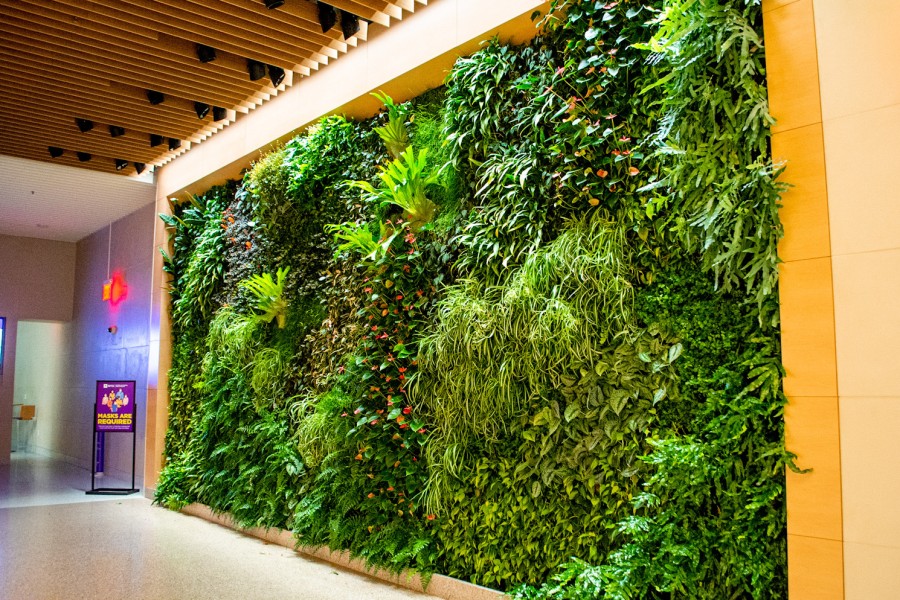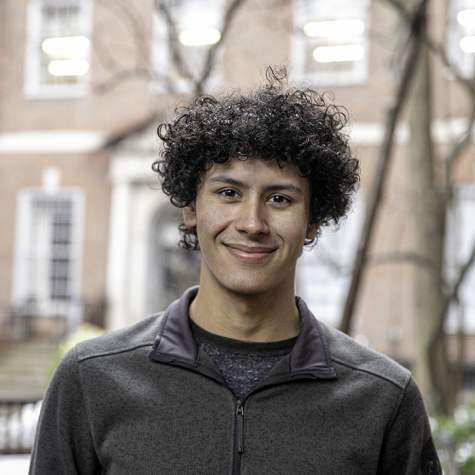NYU: Greenhouse emissions halved by 2025, carbon neutral by 2040
NYU administrators provided updates on the university’s efforts to combat climate change by reducing greenhouse gas emissions at its second annual State of Sustainability address.
An eco-friendly, sustainable wall covered in plants is a centerpiece of NYU’s new Global Public Health building. (Staff Photo by Manasa Gudavalli)
April 26, 2022
NYU president Andrew Hamilton announced that the university is still on track to reduce its greenhouse gas emissions to 50% of what they were in 2006 by 2025 during the second annual State of Sustainability address on April 21.
University administrators, including sustainability director Cecil Scheib and outgoing provost Katherine Fleming, addressed the university’s efforts to become a more sustainable institution and acknowledged those in the community who have led sustainability efforts.
“As a global research university, we have a responsibility to be at the forefront of this issue — certainly among the most vital of our time, which has far reaching consequences for the world and its citizens,” Hamilton said. “While NYU is a large and diverse university, sustainability unites us all.”
The plan to cut greenhouse gas emissions by half was first announced in the 2021 Climate Action Plan Update. Hamilton said this reduction is due in part to the installation of energy-saving technology in university buildings.
According to Hamilton, the university will have installed 304 solar panels on top of Bobst Library by the end of the semester. The panels will generate 110 kilowatts of energy, enough to power the Seventh Street residence hall and about 50 New York City homes for one year.
Scheib said that NYU’s information technology department was honored in January by the Sustainable Purchasing and Leadership Council, a nonprofit that recognizes organizations who make sustainable purchasing decisions, for reducing energy use. According to Scheib, the department’s greenhouse gas reduction efforts had a similar environmental impact as planting 6,200 trees.
NYU also plans to renovate Rubin Hall to add energy-efficient windows and convert its upgrade and hot water infrastructure to eliminate the use of fossil fuels, according to Scheib. The project will be funded by a $2 million grant donated to the university by New York State.
CAS junior Jacqueline Moy, the alternate senator-at-large representing students for sustainability, highlighted the group’s recent environmental justice accomplishments, including an agriculture program that provides students with organic produce in support of local farms. She said the group is also advocating for on-campus bicycle repair stations and a clothing swap in collaboration with other New York City universities.
“We also implemented a green event standard for student government events, helping to reduce waste from our events and make the food served more inclusive and sustainable,” Moy said.
Tandon School of Engineering dean Jelena Kovačević talked about the school’s Sustainable Engineering Initiative — a program composed of 22 Tandon faculty members who will conduct research on climate change. It aims to reduce greenhouse gas emissions by examining the impacts of environmental pollutants, such as pesticides.
“Many of us know that climate change is the single most important issue affecting humanity moving forward,” Kovačević said. “Climate change is a threat to human wellbeing and planetary health. And if we do not act soon, we will miss a brief and rapidly closing window of opportunity to secure a livable and sustainable future for all.”
Fleming announced 2040 Week, a week-long series of exhibitions planned for April next year, to mark the year the university aims to achieve carbon neutrality. Sophie Golomb, the manager of NYU’s Sustainability Office, said there will be opportunities for students to help brainstorm ideas for 2040 Week over the next year.
“The idea is to consider actions and activities that directly confront climate despair and catalyze climate action,” Golomb wrote to WSN. “During 2040 Week, we anticipate an immersive experience of our sustainable future, so community members can participate and envision what life might be like in 2040.”
Contact Gabriel Hawthorne at [email protected].

























































































































































